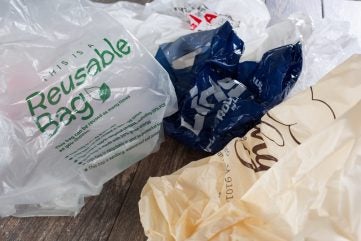
The US state of California became the first to ban single-use plastic bags in 2014. A decade later, its legislators are aiming to extend this law to all types of plastic bags.
As reported by the Los Angeles Times, the proposed legislation requires that by 1 January 2028, at least 30% of plastic items sold, distributed or imported into the state should be recyclable. By 2032, that number will rise to 65% alongside a 25% reduction in single-use plastic waste. If these deadlines aren’t hit, certain materials will be banned.
But environmental packaging technology company Symphony Environmental asserts that such a ban is not the solution. Instead, CEO Michael Laurier believes that regular plastic materials should be upgraded rather than banned outright.
Symphony provides plastic alternatives that enable people to continue using these products. The material technology, called dw2, is not compostable plastic and does not need to be taken to a composting facility.
Laurier explains: “Single-use plastics made with sustainable technology would significantly accelerate the biodegradation process and reduce the accumulation of plastic waste.”
Can paper supplant a plastic bag ban?
Symphony points out that paper and cardboard packaging is often no better than plastic as it requires more than four times the energy to manufacture and uses more land and water. It is also heavier and bulkier, which can increase transportation costs.

US Tariffs are shifting - will you react or anticipate?
Don’t let policy changes catch you off guard. Stay proactive with real-time data and expert analysis.
By GlobalDataManufacturing paper uses land, water, fertiliser and energy resources, and paper is not the best material for protecting food from contamination, especially when wet.
Laurier concludes: “Biodegradable plastics are the only realistic solution to modern packaging waste. It needs no special environmental conditions – all it needs is oxygen. The bacteria and fungi then do the hard work – using the material as a food source and leaving only carbon dioxide, water and humus behind.”
States such as New Jersey have taken lessons from California’s approach to plastic bags, passing their own state legislation.



